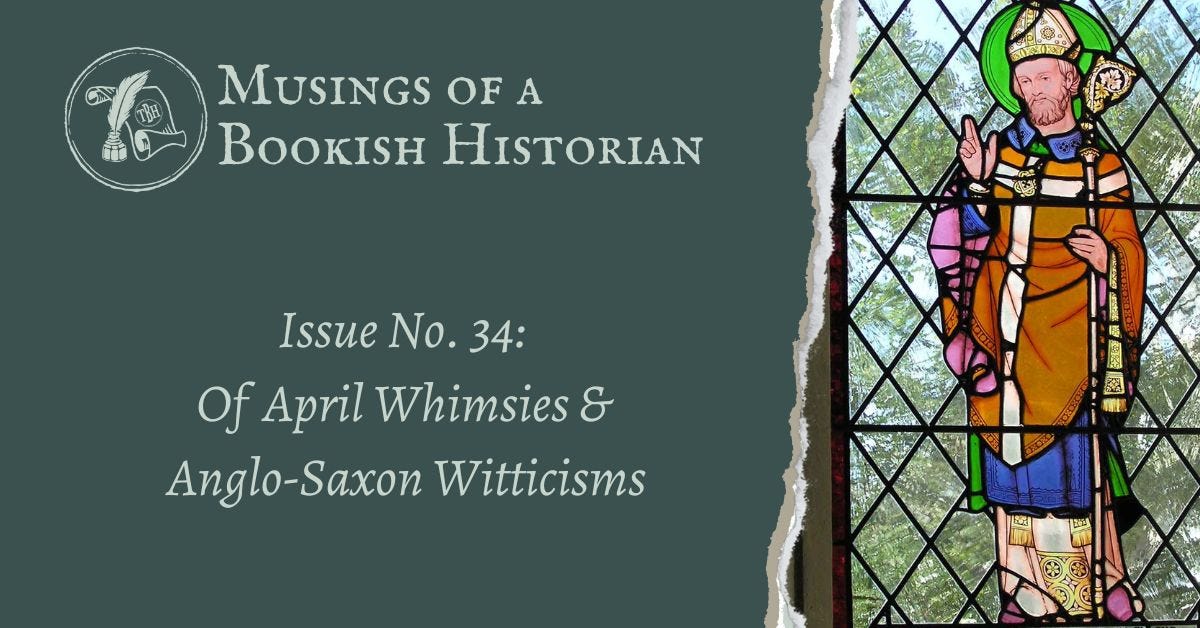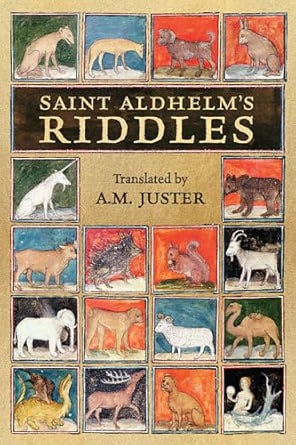Issue No. 34: Of April Whimsies & Anglo-Saxon Witticisms
Anglo-Saxon riddles, Aldhelmian verse, and a large corpora of medieval literature.
Multicoloured as I flee, I leave heaven and earth behind.
There is no place on earth for me, none in the territory of the skies:
No one else fears an exile of such cruelty;
But I make the world grow green with wet drops.
April 1st signifies April Fool’s Day, a period of 24 hours in which people engage in tomfoolery through pranks and jokes. Although we don’t know the holiday’s specific origins, people around the world today appreciate partaking in (mostly) good-natured merriment and banter. Riddles serve both humorous and instructive purposes, encouraging us to critically think as we ascertain a solution. As a literary device, they also reflect their origin’s culture and thought.
Riddles span from ancient to modern history and “exist on two levels, popular (oral) and literary (learned)”.1 In Anglo-Saxon England, riddles make up “a large segment of the extant Old English canon”.2 According to Gwendolyn Morgan, we know little about the practice of riddling among the Anglo-Saxons, but we do know that “eighth-century England saw a generous outpouring of Latin riddles by men believed or known to be high Churchmen” such as the clergyman and writer Aldhelm of Malmesbury and Symphosius.3
This issue centers on the Anglo-Saxon riddle and offers some examples found in the Exeter of Riddles and Aldhelm’s Aenigmata, two contemporary literary sources. While perhaps overlooked compared to other sources like chronicles and charters, riddles nonetheless form a significant part of the Anglo-Saxon history corpora.
Note: There won’t a related artifact this issue.
Riddling the Anglo-Saxons
The riddles contained herein cover a plethora of subjects and likely derive from eight-century Latin riddles as translations or originate as “true folk products and offer scattered suggestions of an association to non-Christian folklore and the Anglo-Saxon version of the universe and its mysteries”.4 That is, riddles arose out of Anglo-Saxon attempts to understand the world around them, relate to their own mythos, and as remnants of classical learning. Morgan writes on the dual nature of riddles, arguing that they express often opposing sides of an object:
The most pervasive characteristic of these poems is the presentation of apparently irreconciliable opposites as clues, the reconciliation of which is necessary to arrive at their answers. This dualism reflects an ambivalence essential to the worldview of their creators. It extends from God and nature, to the human condition, to tools and activities contrived by humans. It colors emotional and intellectual responses to the environment, whether trivial or monumental. And it seems to be a basic function of the riddles to present everyday objects in the light of their dual nature.5
As you read the riddles below, keep this dualism in mind as it can color your interpretation and understanding! Click the footnote number to view the answer!
Riddles from Aldhelm
The clergyman Aldhelm (c. 639 - 609CE) likely descended from Wessexian royalty. In 675, he became Abbot of Malmesbury, and later ascended to the bishopric of Sherborne in 705. Described as “the first English man of letters” (particularly known as the first Anglo-Saxon to use Latin prose), Aldhelm’s influence spread throughout medieval European poets and education.6 His most famous works include the 101 Latin riddles - written in hexameters - found in his treatise Epistola ad Acircium.
Here are some of my favorites:
Riddle #3: Nubes
Multicoloured as I flee, I leave heaven and earth behind.
There is no place on earth for me, none in the territory of the skies:
No one else fears an exile of such cruelty;
But I make the world grow green with wet drops.7
Riddle #6: Luna
Now I am present at the commonplace fate of the sea,
Causing monthly stages with alternating cycles:
For as the glory of my shining shape decreases,
Thus does the overflowing sea lose its swells in the water.8
Riddle #22: Acalatinda
My beautiful voice is transformed through different arrangements,
I shall never sing my songs with a hoarse-sounding beak;
Though dusky in colour, I am not contemptible while singing:
Thus I do not stop singing in fear of a future fate:
For winter drives me out, but I will return immediately in summer.9
Riddle #42: Strutio
The large limbs on my compact body grow feathers.
I am like the hawk in colour, but unlike in the matter of flying
Because I do not travel through the upper air on small wings.
Rather, I walk on my feet through dirty countryside,
Supplying the polished shells of my eggs as cups.
The country said to produce me is Phoenician Africa.10
Riddle #60: Monocerus
Not at all do I fear the hazards of furious Mars,
Although the hunter with the dog barking in vain
Should chatter, the archer brandishing iron-tipped arrows,
On the lofty hills; rather, equipped with great strength,
I, an aggressive warrior, fell elephants with a blow.
Alas! Savage Fortune, who tricked me thus with guile,
For I slaughter great things and am overcome by a harmless virgin!
For, revealing her bosom, the beautiful woman catches me immediately
And, with her wish fulfilled, leads me to the city.
The Greek language gave my name from my horn;
Thus do the Latins speak likewise in their tongue.11
Riddle #87: Clipeus
From the trunk of the willow-tree, also from the cattle’s scraped hide,
Am I composed, awaiting the bloody hazards of war.
I shall always guard the body of my carrier with my own
Body, so that Orcus will not rob the man’s life.
What fierce soldier incurs such losses or so many
Deadly wounds in battle?12
Riddles from the Exeter Book
The late 10th-century Exeter Book offers another source of Anglo-Saxon riddles, albeit without provided answers. This has led to often spirited debate about possible solutions. I’ve provided a couple riddles with perhaps more straightforward answers.
Riddle #11
My garment is darkish. Bright decorations,
red and radiant, I have on my raiment.
I mislead the stupid and stimulate the foolish
toward unwise ways. Others I restrain
from profitable paths. But I know not at all
that they, maddened, robbed of their senses,
astray in their actions —that they praise to all men
my wicked ways. Woe to them then
when the Most High holds out his dearest of gifts
if they do not desist first from their folly.13
Riddle #23
Wob is my name read in reverse.
I’m a beautiful thing, shaped for fighting.
Whenever I am bent and there flies from my bosom
the poisonous dart I am all eager
to drive afar off the deadly bale.
Whenever my master who shaped me that pain
loosens my limb I am longer than before,
till I spit forth again the death-blended bane,
that very fell poison which erst I swallowed.
This that I speak of leaves no man easily
if that which flies from me should ever touch him,
so that perforce he purchases surely with his life
that fatal drink, a full atonement.
Unstrung I obey no man, but only
when skilfully tied. Tell me my name.14
As you can see, riddles - whether in the past or present - invite us to dig a little deeper into the world around us. Sometimes they teach us something; sometimes they make us laugh. But above all, riddles push us to think outside the box and engage with nature and each other, a highly useful skill in any age.
Suggested Reading: Aenigmata by Aldhelm
Although initially written in Latin, I’d recommend reading Aldhelm’s Aenigmata for learning about and reading more riddles in Anglo-Saxon literature. Aldhelm heavily influenced the genre down through the Medieval Ages. Aldhelm’s influence is seen throughout medieval educational curriculum, poets, and general literature - indeed the Exeter Book even contains some translations of Aenigmata riddles.
Sources & Further Reading
Baum, Paull F. Anglo-Saxon Riddles of the Exeter Book (Durham, N.C.: Duke University Press, 1963).
Lapidge, Michael. “The Career of Aldhelm.” Anglo-Saxon England 36 (2007): 15–69. http://www.jstor.org/stable/44510960.
—“Aldhelm’s Latin Poetry and Old English Verse.” Comparative Literature 31, no. 3 (1979): 209–31. https://doi.org/10.2307/1770922.
Morgan, Gwendolyn A. “Dualism and Mirror Imagery in Anglo-Saxon Riddles.” Journal of the Fantastic in the Arts 5, no. 1 (17) (1992): 74–85. http://www.jstor.org/stable/43308139.
Featured image: Stained glass window showing Aldhelm, installed in Saint Aldhelm's Church, Malmesbury (© Wikimedia Commons/Adrian Pingstone, public domain)
Paull F. Baum, Anglo-Saxon Riddles of the Exeter Book (Durham, N.C.: Duke University Press, 1963), ix.
Gwendolyn A. Morgan, “Dualism and Mirror Imagery in Anglo-Saxon Riddles,” Journal of the Fantastic in the Arts 5, no. 1 (17) (1992), 74, http://www.jstor.org/stable/43308139.
Ibid., 75.
Ibid., 75-76.
Ibid., 76.
Michael Lapidge, “The Career of Aldhelm,” Anglo-Saxon England 36 (2007), 15, http://www.jstor.org/stable/44510960.
Answer: Cloud.
Answer: Moon
Answer: Nightingale.
Answer: Ostrich.
Answer: Unicorn.
Answer: Shield.
Accepted answer: Wine.
Accepted answer: Bow.








This is fun!
Really interesting read, thanks!